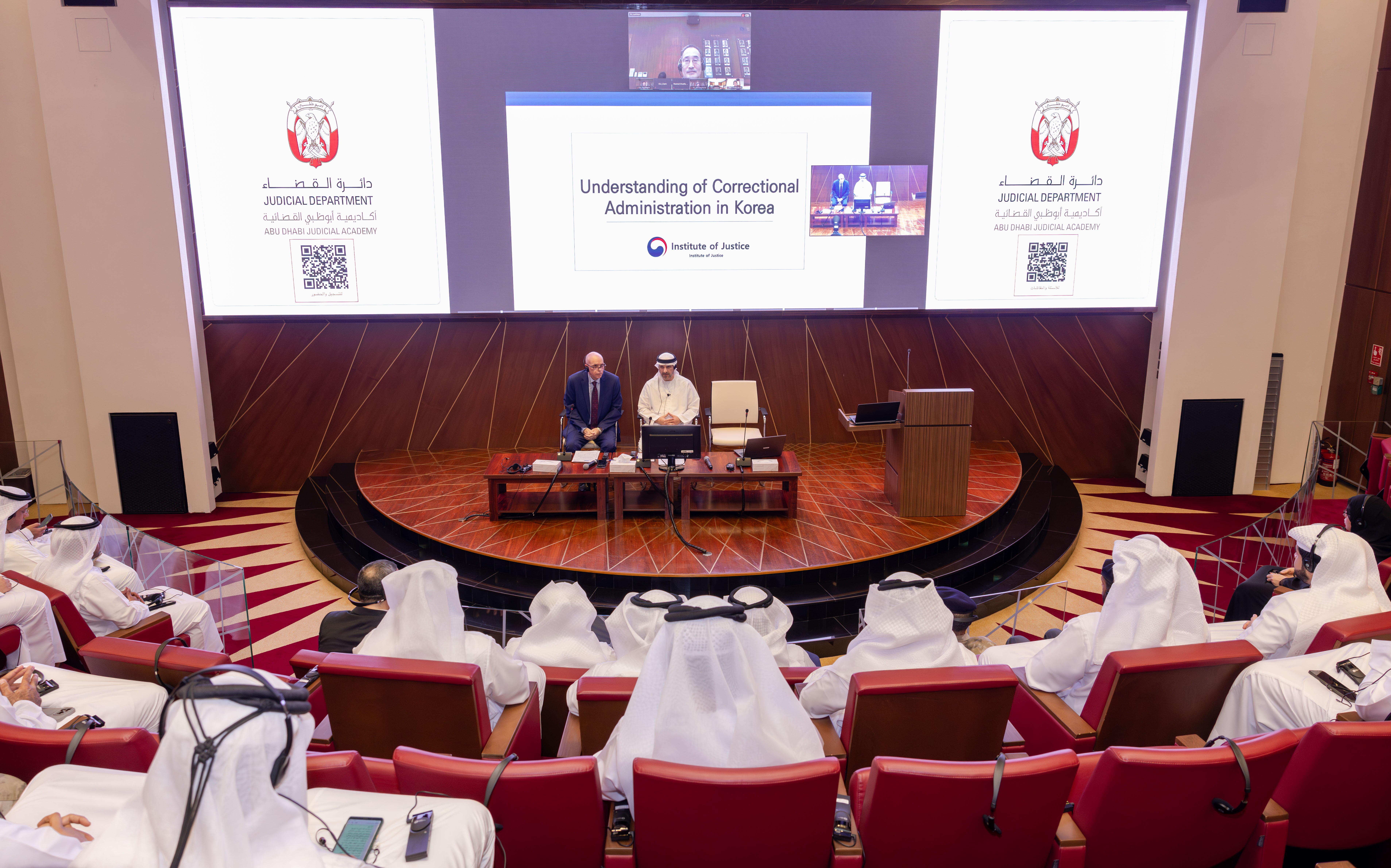The ADJD Exchanges Expertise with the Korean Institute of Justice
26 August 2024
The Abu Dhabi Judicial Department (ADJD), represented by the Abu Dhabi Judicial Academy (ADJA), organised in cooperation with the Institute of Justice of the Republic of South Korea, a workshop on the latest systems implemented in the management of rehabilitation and correctional centres with a view to exchanging knowledge and expertise and learning about the latest international experiences in this field and adopting the finest specialised judicial and legal practices so as to enhance the competitive position of the Emirate of Abu Dhabi on the global stage.
The workshop is part of a series of specialised workshops organised by the Judicial Department in coordination with judicial authorities at the regional and international levels, in line with the directives of His Highness Sheikh Mansour bin Zayed Al Nahyan, Vice President of the UAE, Deputy Prime Minister, Chairman of the Presidential Court, and Chairman of the Abu Dhabi Judicial Department, to strengthen cooperation with partners and get access to international experiences prior to preparing them for application in a manner consistent with the judicial system in Abu Dhabi.
The workshop began with a speech by Counselor Hasan Alhammadi, Director of the Prosecution Affairs Division in Abu Dhabi, who stressed that the UAE attaches the utmost importance to the rehabilitation of inmates in rehabilitation and correctional centres with an aim to reintegrate them into society. The UAE he said has issued many legislations that regulate the management of these centres, in addition to joining international human rights conventions and signing a number of initiatives that support the protection of inmates' rights and provide them with the necessary rehabilitation, health care and educational opportunities.
The issuance of Law No. 4 of 2024 on the regulation of rehabilitation and correctional centres in the Emirate of Abu Dhabi, following the transfer of the management competencies of these centres along with juvenile institutions to the Judicial Department, achieves a qualitative leap and greater effectiveness in developing the work mechanism to support the correction and rehabilitation system and socially and culturally rehabilitate convicted offenders, he said.
Under this law, he added, the name of the "Penal
and Correctional Facilities" was changed to become "Rehabilitation
and Correctional Centres", which is a positive and qualitative start to
change the concept of managing these centres, while promoting the provision of
social and health care services for inmates, in addition to delivering
educational and vocational training programmes to support the achievement of
the objectives of reintegrating them as active and useful members of society.
He pointed out that the tasks of the Rehabilitation and Correctional Centres also include training their staff according to the highest international standards to ensure the application of best practices in the management of the centres, which in turn contributes in enabling them to fulfil their mission of rehabilitating inmates and achieving effective economic management of the system of rehabilitation and correctional centres in the Emirate.
For his part, Lee Ki-hyun, Director of the Correctional Training Department at the Institute of Justice of the Republic of Korea, in his speech, delivered via videoconference, stressed the importance of close cooperation between the Abu Dhabi Judicial Department and the Korean judicial institutions in leveraging the experiences applied in the judicial field and allowing the exchange of insights and ideas on advanced systems for the development of judicial processes as well as training programmes in rehabilitation and correctional centres.
Ahn Hyo Jeong, professor at the Institute of Justice, reviewed the systems applied in the Korean correctional administration based on modern technologies, vocational training programmes for inmates to prepare them for their reintegration into society after serving their sentences, as well as the attention paid to health care programmes with a focus on psychotherapy for its role in preventing and deterring recidivism, especially when dealing with juvenile offenders.
Finally, Lee Seok Jin, a professor at the Institute of Justice, discussed the training and qualification process for correctional officers in Korea, which relies on modern and specialised educational programmes that focus on practical application and field training, to ensure that they perform their duties efficiently and professionally, while promoting legal awareness and protecting human rights when dealing with inmates in correctional and rehabilitation centres.
